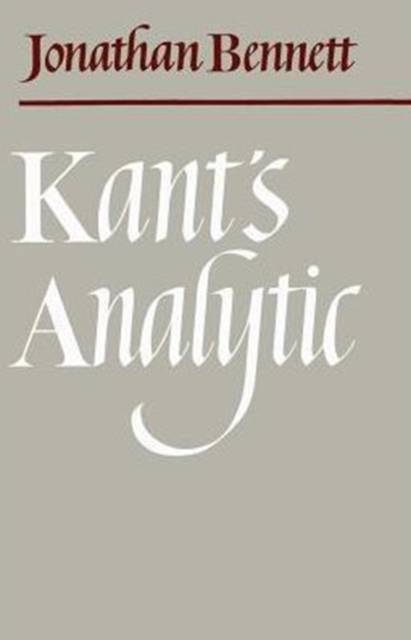
Bedankt voor het vertrouwen het afgelopen jaar! Om jou te bedanken bieden we GRATIS verzending (in België) aan op alles gedurende de hele maand januari.
- Afhalen na 1 uur in een winkel met voorraad
- In januari gratis thuislevering in België
- Ruim aanbod met 7 miljoen producten
Bedankt voor het vertrouwen het afgelopen jaar! Om jou te bedanken bieden we GRATIS verzending (in België) aan op alles gedurende de hele maand januari.
- Afhalen na 1 uur in een winkel met voorraad
- In januari gratis thuislevering in België
- Ruim aanbod met 7 miljoen producten
Zoeken
Omschrijving
'Mr Bennett, as was to be expected, has written a first-rate book on Kant's Analytic. It is vivid, entertaining, and extremely instructive. It will be found of absorbing interest both by those who already know the Critique and by those - if there are any such - who have a developed interest in philosophy, yet no direct acquaintance with Kant. These last it will surely drive to the text and, as surely, will drive them to approach it in a truly philosophical spirit. Bennett's Kant is not a giant immersed, or frozen, in time. He is a great contemporary - a little out of touch, admittedly, with recent developments in mathematics and physics - but one with whom we can all argue, against him, at his side, or obliquely to him. And so Bennett does argue, continuously, fiercely, and fruitfully; and summons to join in the argument, at appropriate moments, those older contemporaries, Locke, Leibniz, Berkeley, and Hume, and those younger contemporaries, Wittgenstein, Ryle, Ayler, Quine, Quinton, Warnock, and others. This is splendid, and a necessary corrective to that extraordinary isolation in which Kant tends to be islanded, partly indeed, by his own unique qualities, but partly by oceans of the wrong kind of respect. Bennett, continuously engaging his great antagonist, shows the right kind.'
Specificaties
Betrokkenen
- Auteur(s):
- Uitgeverij:
Inhoud
- Aantal bladzijden:
- 268
- Taal:
- Engels
Eigenschappen
- Productcode (EAN):
- 9780521093897
- Verschijningsdatum:
- 1/01/1966
- Uitvoering:
- Paperback
- Formaat:
- Trade paperback (VS)
- Afmetingen:
- 140 mm x 217 mm
- Gewicht:
- 371 g

Alleen bij Standaard Boekhandel
+ 152 punten op je klantenkaart van Standaard Boekhandel
Beoordelingen
We publiceren alleen reviews die voldoen aan de voorwaarden voor reviews. Bekijk onze voorwaarden voor reviews.









